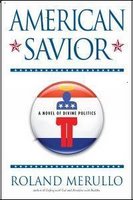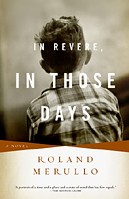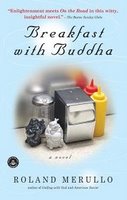 Today's guest blogger is Roland Merullo, who shares his experiences participating in community-wide reads and ruminates on the relationship between writer and reader.
Today's guest blogger is Roland Merullo, who shares his experiences participating in community-wide reads and ruminates on the relationship between writer and reader.Roland is the author of seven novels, most recently American Savior, and two books of nonfiction. His novels In Revere, In Those Days and Breakfast with Buddha have been read by North Reading and Winchester, Massachusetts, Broomfield, Colorado and (this spring) Wayland, Massachusetts. Breakfast with Buddha was recently nominated for the Dublin International Literary Prize. He lives in western Massachusetts with his wife and two daughters.
Over the past five or six years, I have been exceptionally fortunate to have had two different novels selected for community reads in four different cities, and then to have been invited to speak to the readers in those cities. For me, this has been like taking the pleasure of speaking to a book club and expanding it by a factor of ten or more. It's also been a little strange.
The strangeness comes from the odd mix of the writer's life, a life that is primarily solitary but speckled now and then with public events. In my case, this dichotomy might be especially noticeable because I don't have a teaching job, or any other work, and spend large amounts of time alone at my desk. Yes, I have a wife and two daughters and I love to be with them. But, in my working life, I am alone in a second-floor room I built with my own hands, that looks out on the unpeopled hills of western Massachusetts. It's wonderful, that solitude; I don't think I could write without it. But I like people, too, and have a gregarious side, and so going out into
 the world for reading tours, or to talk to book clubs, or, especially, to stand in front of an auditorium full of people who have all read one of my books in the same time period --- that balances things like the third and fifth notes in a piano chord.
the world for reading tours, or to talk to book clubs, or, especially, to stand in front of an auditorium full of people who have all read one of my books in the same time period --- that balances things like the third and fifth notes in a piano chord.In a world where we are increasingly isolated from each other --- commuting in our cars, working in cubicles, lacking some of the old bonds that united communities a generation or two ago --- a city-wide or town-wide read is one place where the individual blends into the collective. So much emphasis is put on individual identity and the ways we are different from each other (gender, race, age, income, sexuality, religious orientation or lack of it, ethnicity, political party) that it's easy to forget we are more alike than different, that all of us have in common the most important things. We all love, fear, worry, struggle with the winds of good and bad fortune, have family situations of one kind or another, in past or present or both, and all the blessings and trials that go along with that. In the most fundamental ways we are all in this together, and books remind us of that. I have always loved the intimacy of the writer-reader relationship. A passion for reading is surely what steered me towards this profession in the first place. But when that intimacy is expanded in a book club or a community read, it is enriched exponentially.
It is a little daunting to stand up in front of a hundred or more people who have all read something you wrote, often something personal --- and all works of the imagination are personal. What if they hated it? What if there was a sentence or a character or a chapter that really turned everyone off? What if they loved the book but are disappointed in meeting the actual flawed human being who wrote it?
 But these talks have always turned out to be inspiring --- for me, at least. I especially like the question and answer period, and have gotten to the point where I shrink the talk, almost eliminate the reading, and lengthen the Q&A. What makes it so satisfying is the care that readers gave to your book, a level of attention that matches (and sometimes exceeds) the level of attention and care you put into it. It reveals exactly what writing is supposed to be about, I think: going deep into yourself to come up with a story that makes others go deep into themselves. It is a kind of soul-to-soul link, even if all you were trying to do in the book was make people laugh.
But these talks have always turned out to be inspiring --- for me, at least. I especially like the question and answer period, and have gotten to the point where I shrink the talk, almost eliminate the reading, and lengthen the Q&A. What makes it so satisfying is the care that readers gave to your book, a level of attention that matches (and sometimes exceeds) the level of attention and care you put into it. It reveals exactly what writing is supposed to be about, I think: going deep into yourself to come up with a story that makes others go deep into themselves. It is a kind of soul-to-soul link, even if all you were trying to do in the book was make people laugh.I have come away from these gatherings with a profound gratitude, a sense that those hours alone at the desk really do matter. More than that, though --- and I think this is part of the reason we form book clubs and do community reads in the first place --- I've come away with a heightened sense of our common humanity. You get that important gift from a marriage, a family, from friendships and teams, from work associations sometimes. And from reading a book together and talking about it.
---Roland Merullo






